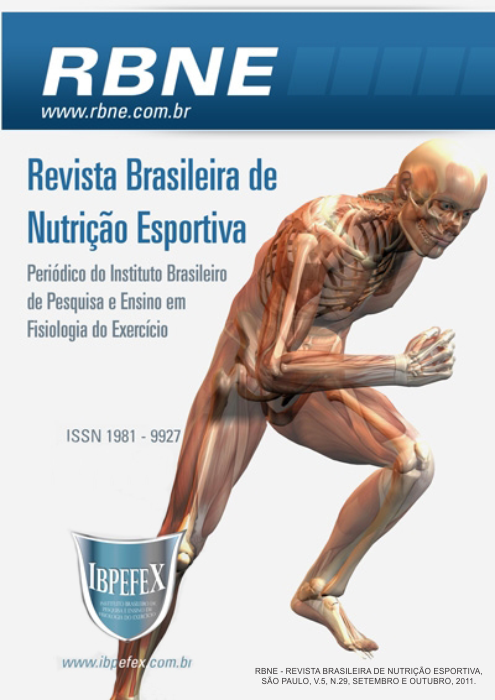Evaluation of the profile and basic knowledge of physical educators on the academies of food supplementation in Belo Horizonte –MG
Abstract
This study had as objective to avaliate the physicaleducators’ information and basics knowledge that work at gym about food supplementation. The gyms’ were choosen aimlessly, and all the physical educators that work at them participated of the study. 86 physical educators answered a questionnaire with 13 objective questions. The most expressive results were: 31.4% and 25.6% get actualized by internet and non scientific magazines, respectively, about subjects related to supplementation; 83.7% never prescrived supplementation for their clients; in those who indicate, 57.2% indicate maltodextrin or proteins and 50% already prescribed supplementation for competitions athletes. Questions to avaliate the physical educators’ knowledge about supplementation were made. 61.6% believe that a balanced alimentation supplies the protein necessity; 59.3% affirm that more protein ingestion, more muscle hypertrophy; 57% knew about the creatin’s purpose; 41.8% know the L-carnite’s function and 60% think that the excess of vitamins is harmful to the health. Concluding that even a bunch of physical educators have a nice knowledge about supplementation, the part of them that don’t have this knowledge is still large, once few has courses about the subject and the ways that they use to actualize almost never are trustworthy.
References
-Alves, L.A. Recursos ergogênicos nutricionais. Rev. Min. Educ. Fís., Viçosa. Vol. 10. Num. 1. 2002. p. 23-50.
-Araújo, L.R.; Andreolo, J.; Silva, M.S. Utilização de suplemento alimentar e anabolizante por praticantes de musculação nas academias de Goiânia-GO. Rev. Bras. Ciên. e Mov. Brasília. Vol.10. Num. 3.2002. p. 13-18.
-Domingues, S.F.; Marins, J.C.B. Utilização de recursos ergogênicos e suplementos alimentares por praticantes de musculação em Belo Horizonte -MG. Fit. Perf. J.Rio de Janeiro. Vol. 6. Num. 4.2007. p. 218-226.
-Hirschbruch, M.D.; Fisberg, M.; Mochizuki, L. Consumo de suplementos por jovens freqüentadores de academias de ginástica em São Paulo. Rev Bras Med Esporte, Niterói. Vol.14. Num.6. 2008. p. 539-543.
-Linhares, T.C.; Lima, R.M. Prevalência do uso de suplementos alimentares por praticantes de musculação nas academias de Campos dos Goytacazes/RJ, Brasil. Vértices. Vol. 8. Num. 1/3.2006.
-Neiva, C.M.; e Colaboradores. Aspectos gerais e indicadores estatísticos sobre consumo de suplementos nutricionais em academias de ginástica. Revista Nutrição em Pauta,2007.
-Pereira, J.M.O.; Cabral, P. Avaliação dos conhecimentos básicos sobre nutrição de praticantes de musculação em uma academia da cidade de Recife. Revista Brasileira de Nutrição Esportiva, São Paulo. Vol. 1. Num. 1.2007. p. 40-47.
-Pereira, R.F.; Lajolo, F.M.; Hirschbruch, M.D. Consumo de suplementos por alunos de academias de ginástica em São Paulo. Rev. Nutr. Campinas. Vol. 16. Num. 3. 2003. p. 265-272.
-Sociedade Brasileira de Medicina do Esporte. Modificações dietéticas, reposição hídrica, suplementos alimentares e drogas: comprovação de ação ergogênica e potenciais riscos para a saúde. Rev Bras Med Esporte. Vol. 9. Num. 2. 2003. p.43-56.
Authors who publish in this journal agree to the following terms:
- Authors retain the copyright and grant the journal the right of first publication, with work simultaneously licensed under the Creative Commons Attribution License BY-NC which allows the sharing of the work with acknowledgment of the authorship of the work and initial publication in this journal.
- Authors are authorized to enter into additional contracts separately for non-exclusive distribution of the version of the work published in this journal (eg, publishing in institutional repository or book chapter), with acknowledgment of authorship and initial publication in this journal.
- Authors are allowed and encouraged to post and distribute their work online (eg, in institutional repositories or on their personal page) at any point before or during the editorial process, as this can bring about productive change as well as increase impact and impact. citation of published work (See The Effect of Free Access).






